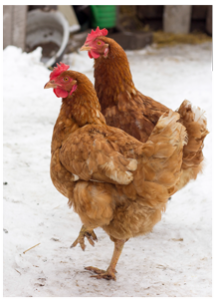Cold Weather Poultry Considerations
Click here to view as a pdf: Cold Weather Poultry Considerations
With winter just around the corner, Crystal Creek® wants to make sure that you and your chickens are prepared. Here are some tips and tricks to ensure that your birds make it through the upcoming cold season with “flying colors”.
Ventilation
Ventilation and draft minimization are key. Any holes or gaps in the coop or barn should be covered to prevent drafts. Keep in mind, birds need proper air flow to minimize ammonia build up and provide fresh air. This can be accomplished by having screened vents toward the ceiling to allow the ammonia to escape without bringing in gusts of chilly air. 
Maintain Warmth
One way to keep warmth within your coop or barn is to use the deep litter method. This involves aerating the current litter and adding fresh top litter on a regular basis.
Heat lamps are another option if your coop has electricity, but be careful to place the lamps at least 2 feet away from any potentially flammable materials.
Nutrition
Birds need calories to maintain their body heat and fresh water to maintain proper digestion and kidney function. If you are not already doing so, you may want to consider free choice feeding and giving your birds access to fresh feed all day and all night so that they can adjust their intakes accordingly.
Checking the water every day to make sure it isn’t freezing is paramount to keeping birds comfortable and healthy. Water heaters are also available if your barn or coop has electricity.
Outdoor Access
Active birds are happy birds! Providing them with a covered area outside is a great way to give them the freedom they need while also shielding them from the worst of the elements.
Supplying enough roosting space off the ground is another valuable point to keep in mind when considering outdoor, cold weather accommodations.
Additional Ideas To Consider
Birds’ waddles and combs are more susceptible to frostbite and some raisers find that coating them in a thin layer of Udder Fancy,™ when temperatures reach below freezing, helps protect them.
Chickens that are used to foraging and pecking the ground outdoors may turn on one another when confined inside. You can prevent pecking and cannibalism within your flock by providing them with supplemental sunflower seeds, cabbage, corn stalks and even loose straw.
Here’s to a happy and healthy winter season for you, your family and your birds!
